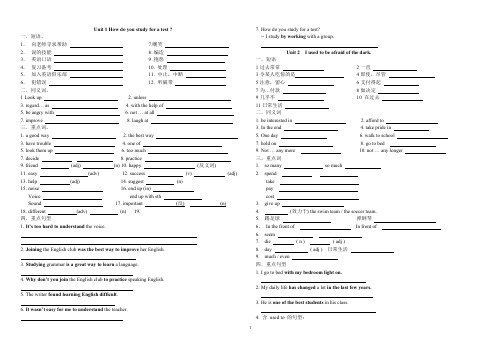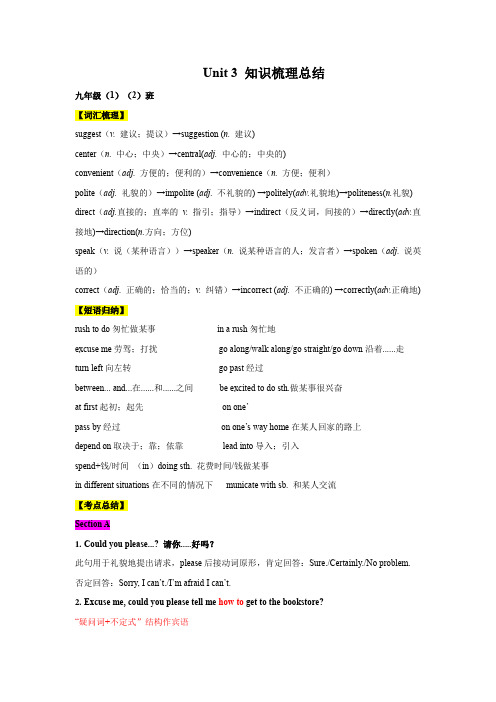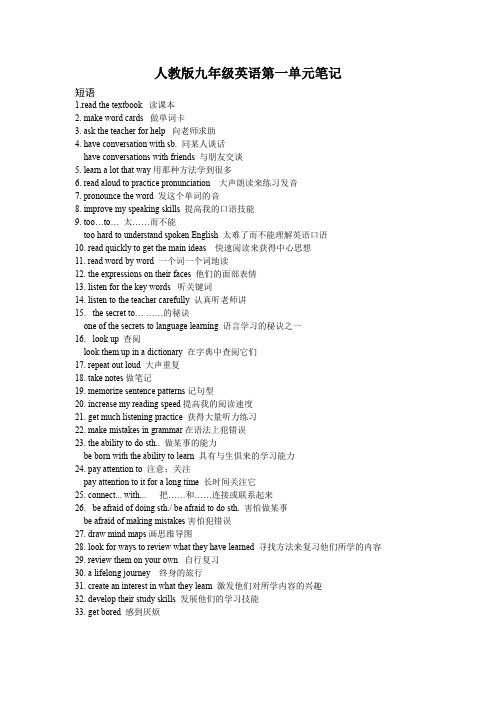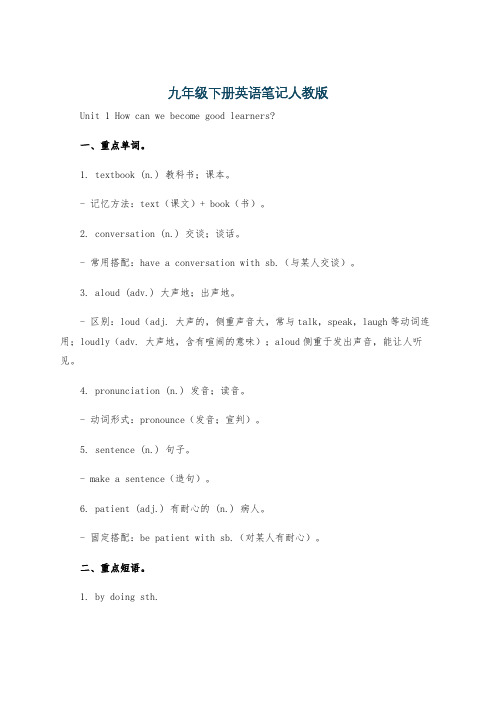九年级人教版英语学习笔记
人教版九年级英语单元笔记梳理

Unit 1 How do you study for a test ?一.短语。
1.向老师寻求帮助7.嘲笑2.说的技能8 .编造3.英语口语9 .抱怨4.复习备考10. 处理5.加入英语俱乐部11. 中止,中断6.犯错误12. 听磁带二.同义词。
1 Look up 2. unless3. regard… as4. with the help of5. be angry with6. not … at all7. improve 8. laugh at三.重点词。
1. a good way2. the best way3. have trouble4. one of5. look them up6. too much7. decide 8. practice9. friend (adj) (n) 10. happy (反义词)11. easy (adv) 12. success (v) (adj) 13. help (adj) 14. suggest (n)15. noise 16. end up (in)Voice end up with sthSound 17. important (反) (n) 18. different (adv) (n) 19.四.重点句型1. It’s too hard to understand the voice.2. Joining the English club was the best way to improve her English.3. Studying grammar is a great way to learn a language.4. Why don’t you join the English club to practice speaking English.5. The writer found learning English difficult.6. It wasn’t easy for me to understand the teacher.7. How do you study for a test?-- I study by working with a group..Unit 2 I used to be afraid of the dark.一.短语1过去常常2一直3令某人吃惊的是4即使,尽管5注意,留心6支付得起7为…付款8做决定9几乎不10 在过去11日常生活二.同义词1. be interested in2. afford to3. In the end4. take pride in5. One day6. walk to school7. hold on8. go to bed9. Not … any more 10. not … any longer 三.重点词1.so many so much2.spendtakepaycost3.give up4.(效力于) the swim team / the soccer team.5.踢足球弹钢琴6.In the front of In front of6.seem7.die ( n ) ( adj )8.day ( adj ) 日常生活9.much / even四.重点句型1. I go to bed with my bedroom light on.2. My daily life has changed a lot in the last few years.3. He is one of the best students in his class.4. 含used to 的句型:肯定句:否定句:一般疑问句:5. be used toused to6 with the door / window With the lightUnit3 Teenagers should be allowed to choose their own clothes.一短语1 打…的耳动2 代替,而不是3 在校期间的晚上4 打扫5 到达6 对…严格要求7 集中精力于8 两个…都9 目前10 有机会做11 养老院12 驾照13 同意sb 14 不同意sb16 担心17 实现sb 的梦想18 做决定19 关注20 职业运动员21 答复22 至少23 …的重要性二同义词1 achieve one’s dream2 get to3 go back / come back4 give back三重点词1 stop2 seem3 need4 noise (adj)5 like (prep)6 sleep (adj)7 other8 others 9 another10 the other 11 sixteen –year –old12 realize sixteen—year—olds13 succeed (n) (adj) (adv)14 own (v) (adj)15 too either also16 Saturday afternoon 17 be strict sb18 stay up 19 would like20 be strict sb be strict sth 四重点句型1. 含情态动词的被动语态;肯定句:否定句:疑问句:2mustcan’tcould / mightmay3Teenagers should be allowed to choose their own clothes..4I think students should be allowed to do homework with friends.--I disagree. They talk instead of doing homework.5I don’t think sixteen-year-olds should be allowed to drive.--I agree. They aren’t serious enough.6 Longer vacation would give us time to do things like volunteering.7 Last summer I had an opportunity to volunteer at the local hospital.8 Everyone need to have at least eight hours’ sleep a night.Unit 4 What would you do if you had a million dollars?一.短语1 医疗机构2 穿衬衫打领带3 如果…该怎么办4 太… 而不能5 害怕6 当众,公开地7 变得紧张8 几乎不9 在… 的前面10 未经允许11 感冒12 征求某人的允许13 下次14 介绍自己15 足够多的16 和… 相处17 而不是18 立刻,马上19英语演讲比赛20 名列前茅21 急救22 出版,发行23 偶然地,意外地24 事实上25 把sth 藏起来以免让sb看见二.同义词1.Let sb down 2 right away3 get along with4 not… in the slightest三.重点词1. would rather than .=2 energy (adj) create (adj) confidence (adj ) friend (adj )3 before after4 knowledge (adj )5 advice (n) suggest (n)四.重点句型。
九年级英语人教版unit3笔记

九年级英语人教版unit3笔记一、重点单词。
1. restroom.- n.(美)洗手间;公共厕所。
例如:I need to find a restroom quickly.(我需要快速找到一个洗手间。
)2. stamp.- n. 邮票;印章。
如:He collects stamps as a hobby.(他把收集邮票当作一种爱好。
)- v. 跺脚;盖章。
例如:She stamped her foot angrily.(她生气地跺了跺脚。
)3. bookstore.- n. 书店。
I bought this book at the bookstore yesterday.(我昨天在这家书店买了这本书。
)4. beside.- prep. 在……旁边;在……附近。
The park is beside the river.(公园在河边。
)5. postcard.- n. 明信片。
He sent me a postcard from Paris.(他从巴黎给我寄了一张明信片。
)6. pardon.- v. 原谅;请再说一遍。
Pardon me, I didn't catch your words.(对不起,我没听清你的话。
)- n. 原谅;宽恕。
I beg your pardon for being late.(请原谅我迟到了。
)7. washroom.- n. 洗手间;厕所(同restroom,比较口语化)。
Can you tell me where the washroom is?(你能告诉我洗手间在哪里吗?)8. bathroom.- n. 浴室;洗手间。
There is a bathtub in the bathroom.(浴室里有一个浴缸。
)9. normal.- adj. 正常的;一般的。
It's normal to feel nervous before an exam.(考试前感到紧张是正常的。
Unit3笔记人教版英语九年级全册

Unit 3 知识梳理总结九年级(1)(2)班【词汇梳理】suggest(v.建议;提议)→suggestion (n. 建议)center(n.中心;中央)→central(adj.中心的;中央的)convenient(adj. 方便的;便利的)→convenience(n. 方便;便利)polite(adj.礼貌的)→impolite (adj. 不礼貌的) →politely(adv.礼貌地)→politeness(n.礼貌) direct(adj.直接的;直率的v. 指引;指导)→indirect(反义词,间接的)→directly(adv.直接地)→direction(n.方向;方位)speak(v.说(某种语言))→speaker(n.说某种语言的人;发言者)→spoken(adj.说英语的)correct(adj.正确的;恰当的;v.纠错)→incorrect (adj. 不正确的) →correctly(adv.正确地)【短语归纳】rush to do匆忙做某事in a rush匆忙地excuse me劳驾;打扰go along/walk along/go straight/go down沿着......走turn left向左转go past经过between... and...在......和......之间be excited to do sth.做某事很兴奋at first起初;起先on one’pass by经过on one’s way home在某人回家的路上depend on取决于;靠;依靠lead into导入;引入spend+钱/时间(in)doing sth. 花费时间/钱做某事in different situations在不同的情况下municate with sb. 和某人交流【考点总结】Section A1.Could you please...? 请你.....好吗?此句用于礼貌地提出请求,please后接动词原形,肯定回答:Sure./Certainly./No problem.否定回答:Sorry, I can’t./I’m afraid I can’t.2.Excuse me, could you please tell me how to get to the bookstore?“疑问词+不定式”结构作宾语①how to do e.g. Please tell me how to deal with these old books.②what to do e.g. Could you please tell me what to do next.③when to do e.g. We haven’t decided when to start.3.问路及指路的表达方式.问路:Could you please tell me the way to...?Where is...?Do you know if there is a ... near here?Can you tell me how I can get to...?指路:Go along/Walk alone/Go down the street until...Turn left at the second turning/crossing.4.The bookstore is on your right, beside the bank.beside (prep.) 在......旁边;在.....附近 e.g. The bookstore is beside the mall.besides (prep.) 除.....之外(还)... e.g. We also like chemistry besides physics.5.You don’t need to rush.(1)作动词,意为“仓促;匆忙行事”rush out of冲出rush into 冲进......里(2)作名词,意为“仓促;匆忙”in a rush仓促;匆忙作名词,还可意为“特别忙碌的时期”at the rush hour在(交通)高峰期6.I was scared at first, but shouting did help.在英语中,通常把助动词do/does/did放在动词原形前,用以加强语气,意为“真的;的确”。
九年级上册英语人教版笔记

九年级上册英语人教版笔记一、Unit 1 How can we become good learners?1. 重点单词。
- aloud:adv. 大声地;出声地。
例如:Read aloud so that we can all hear you.(大声朗读以便我们都能听到你。
)- pronunciation:n. 发音;读音。
Your pronunciation is very good.(你的发音很好。
)- patient:adj. 有耐心的;n. 病人。
Be patient with children.(对孩子们要有耐心。
)- expression:n. 表达(方式);表示。
Facial expressions can show our feelings.(面部表情能展示我们的感受。
)2. 重点短语。
- by doing sth.:通过做某事。
We can improve our English by reading English books.(我们可以通过读英语书提高英语。
)- make mistakes:犯错。
Everyone makes mistakes when they learn something new.(每个人在学习新东西的时候都会犯错。
)- look up:查阅;抬头看。
Look up the new word in the dictionary.(在词典里查阅这个新单词。
)3. 重点句型。
- How do you study for a test?(你如何为考试而学习?)- I study by working with a group.(我通过小组合作来学习。
)- The more you read, the faster you'll be.(你读得越多,你就会读得越快。
)二、Unit 2 I think that mooncakes are delicious!1. 重点单词。
人教版九年级英语第一单元笔记

人教版九年级英语第一单元笔记短语1.read the textbook读课本2. make word cards做单词卡3. ask the teacher for help向老师求助4. have conversation with sb. 同某人谈话have conversations with friends 与朋友交谈5.learn a lot that way用那种方法学到很多6.read aloud to practice pronunciation 大声朗读来练习发音7.pronounce the word 发这个单词的音8.improve my speaking skills 提高我的口语技能9.too…to… 太……而不能too hard to understand spoken English 太难了而不能理解英语口语10.read quickly to get the main ideas 快速阅读来获得中心思想11.read word by word 一个词一个词地读12.the expressions on their faces 他们的面部表情13. listen for the key words听关键词14.listen to the teacher carefully 认真听老师讲15.the secret to… ……的秘诀one of the secrets to language learning 语言学习的秘诀之一16.look up 查阅look them up in a dictionary 在字典中查阅它们17.repeat out loud 大声重复18. take notes做笔记19.memorize sentence patterns记句型20.increase my reading speed提高我的阅读速度21. get much listening practice 获得大量听力练习22.make mistakes in grammar在语法上犯错误23.the ability to do sth.. 做某事的能力be born with the ability to learn 具有与生俱来的学习能力24.pay attention to 注意;关注pay attention to it for a long time 长时间关注它25.connect... with... 把……和……连接或联系起来26.be afraid of doing sth./ be afraid to do sth. 害怕做某事be afraid of making mistakes害怕犯错误27. draw mind maps画思维导图28.look for ways to review what they have learned 寻找方法来复习他们所学的内容29. review them on your own自行复习30.a lifelong journey 终身的旅行31.create an interest in what they learn 激发他们对所学内容的兴趣32.develop their study skills 发展他们的学习技能33. get bored 感到厌烦34. be stressed out 表示情绪紧张或精神压力大;表示过度疲劳35. depend on 取决于;依靠36. decide to do sth. 决定做某事37. deal with 处理38. worry about sb./ sth. 担心某人/某事39. be angry with sb. 生某人的气40. go by (时间)过去41.重点句型1. —How do you learn English?你如何学英语?—I learn by studying with a group. 我通过小组学习。
人教版九年级英语单元笔记梳理

15 足够多的 17 而不是 19 英语演讲比赛
16 和 … 相处 18 立刻,马上 20 名列前茅
21 急救 23 偶然地,意外地
22 出版,发行 24 事实上
25 把 sth 藏起来以免让 sb 看见 二. 同义词
1. Let sb down
2 right away
3 get along with 三. 重点词
4 He might be running to catch a bus.
3 What if I don’t know anyone?
5 My parents called the police, but they can’t find anything strange.
4 I don ’t know what to say or to do.
Prefer =
.
2. a great place
(adj) 4. Italy
(n )
6. agree
.
(否定 )
.
.
. (adj)
(n)
.
8. look for 9. can’t stand
find out 10. clear
(adv)
学习必备
11. would like
12 exhibit
(N)
because of 8 happy 10 forget
Unit5 It must belong to Carla
2 属于 4 编造,构成 6 逃离 8 上车 10 迟到
2 author 4 gift 6 use up
sth (反 )
2 pretend 4 whose 6 try 7 look / feel 9 let / make 11 remember
九年级下册英语笔记人教版

九年级下册英语笔记人教版Unit 1 How can we become good learners?一、重点单词。
1. textbook (n.) 教科书;课本。
- 记忆方法:text(课文)+ book(书)。
2. conversation (n.) 交谈;谈话。
- 常用搭配:have a conversation with sb.(与某人交谈)。
3. aloud (adv.) 大声地;出声地。
- 区别:loud(adj. 大声的,侧重声音大,常与talk,speak,laugh等动词连用;loudly(adv. 大声地,含有喧闹的意味);aloud侧重于发出声音,能让人听见。
4. pronunciation (n.) 发音;读音。
- 动词形式:pronounce(发音;宣判)。
5. sentence (n.) 句子。
- make a sentence(造句)。
6. patient (adj.) 有耐心的 (n.) 病人。
- 固定搭配:be patient with sb.(对某人有耐心)。
二、重点短语。
1. by doing sth.- 意思:通过做某事。
例如:You can improve your English by reading English books.(你可以通过读英语书提高英语水平。
)2. make mistakes.- 意思:犯错。
例如:Everyone makes mistakes when they learn something new.(每个人在学习新东西的时候都会犯错。
)3. look up.- 意思:(在词典、参考书中或通过电脑)查阅;抬头看。
例如:Look up the word in the dictionary if you don't know it.(如果你不认识这个单词就查字典。
)三、重点句型。
1. What about reading aloud to practice pronunciation?- 分析:What about...? 用于提出建议或征求意见,其后接名词、代词或动名词形式。
Unit10笔记人教版英语九年级全册

Unit 10 知识梳理总结【词汇梳理】greet(v.和......打招呼;迎接)→ greeting (n. )relax(v.放松;休息)→ relaxed (adj. 放松的;自在的)→ relaxing (adj. 令人放松的)value(n.价值)→valuable(adj.贵重的;宝贵的)→ be of great value很有价值north(n.北;北方;adv.朝北;向北)→northern(adj.北方的;北部的)east(n.东;东方;adv.朝东;向东)→eastern(adj.东方的;东部的)behave(v.表现;举止)→ behavior (n. 行为;举止;态度)→wellbehaved表现好的suggest(v.建议)→ suggestion (n. 建议)drop by(顺便拜访)→ dropped(过去式;过去分词)【短语归纳】shake hands握手be supposed to do 应该做某事for the first time首次;第一次make mistakes犯错误as soon as 一......就...... hold out伸出to one’s surprise令某人惊讶的是find out查明;弄清(情况)the capital of... ......的首都at noon在中午be/get mad at/with sb. 对某人很生气drop by顺便拜访;随便进入as...as sb. can/could某人尽可能...... on time准时after all毕竟;终归get mad大动肝火;气愤make an effort做出努力big deal重要的事;大人物on/at the coast在海边knock on/at the door敲门table manners餐桌礼仪take off脱下(衣服);(飞机)起飞be worth doing值得做...... stick sth. into将某物插入point at指向go out of one’s way特地;格外努力make sb. feel at home使某人感到宾至如归be excited about... 对......感到兴奋look forward to+doing 期望做某事show up出现;露面【考点总结】1.You’re supposed to shake hands.be supposed to 应该,相当于shoulde.g.We are supposed to help each other.=We should help each other.【注】suppose意为“认为;推断”时,其后常接宾语从句,在宾语从句中否定要前移。
- 1、下载文档前请自行甄别文档内容的完整性,平台不提供额外的编辑、内容补充、找答案等附加服务。
- 2、"仅部分预览"的文档,不可在线预览部分如存在完整性等问题,可反馈申请退款(可完整预览的文档不适用该条件!)。
- 3、如文档侵犯您的权益,请联系客服反馈,我们会尽快为您处理(人工客服工作时间:9:00-18:30)。
九年级人教版英语学习笔记Revised final draft November 26, 2020Unit 1 How can we become good learners1、How引导的特殊疑问句:①询问方式或手段:“怎样”如:How do you study English?---I study by reading aloud.②用于彼此间打招呼、问候、询问身体状况:如:How do you do---How do you doHow are you---I’m fine/ well/ Ok.③询问天气或程度:如:How’s the weather?=What’s the weather like?----It’s sunny/ cloudy/raining.④询问年龄:如:How old is she?=What’s her age?---She is 15 (years old)⑤征求意见或建议用:How about= What about + n/ 代词/ V-ing.如:How about _______(play) basketball?⑥询问频率用:How often如:How often do you exercise---Once a day.⑦询问可数名词的数量用:How many如:How many students are there in your class?---There are 50 students in our class⑧询问不可数名词的数量用:How much.如:How much meat ____(be) there in the fridge?---Only a little.此外:How much还可以用于询问价格。
How much is your coat---It’s 50 yuan.注:询问价格用:How much is/ are sth = What’s the price of sth?东西有贵(expensive = dear)贱(cheap = inexpensive),价格(price)有高(high)低(low)如:This coat is very cheap.The price of this coat is very low.⑨询问次数用:How many times“多少次”如:How many times do you go to the park a week?----Three times.⑩询问长度、时间长短用:How long如:How long is the boat----About 3 meters.How long will you stay there?---For 2 days注:用How long提问,用:For+时间段或since+时间点回答(其中,for可以省略)。
⑾询问将来时间多久用:How soon如:How soon will you come back?---I’ll be back in ten minutes.注:用How soon提问,用:In+时间段回答。
⑿询问距离远近用:How far “多远”如:How far is it from your home to school?---It’s about 2 kilometers (away) It’s about 10 minutes’ walk/ ride.It’s about 10—minute walk/ ride. 2、V + by + V-ing :表示方式,手段。
“靠做…怎么样”如:How do you study English?----I study by __________(listen) to tapes.3、voice, noise, sound的区别:“声音”①voice:主要指人的笑声、歌声、说话声。
强调人的“嗓音”,多指乐音。
如:Her voice sounds very sweet.②noise:指“嗓音”,其形容词是noisy.如:Don’t make so much noise, father is sleeping③sound:指“物体”的声音”,自然界的一切声音。
如:The sweetest sound in the world is birds’ singing.4、too, also, either, as well的区别:①too:用于肯定句,放在句末,且前面有逗号。
如:I like apples, too.②either:用于否定句。
如:I don’t like oranges, either.③also:用于肯定句,放在句中。
置于be动词、助动词、情态动词之后,实义动词之前。
如:I can also swim.I also like pears④as well:用于肯定句,放在句末,但前面没有逗号。
如:I like apples as well.5、little, a little, few, a few的区别:①有a表示肯定,“有”,无a表示否定,“没有”;②little修饰不可数名词,few修饰可数名词。
如:Can you speak English---Yes, only____A. littleB. a littleC. fewD. a few6、find的用法:①find sb do sth 发现某人做…(全过程)②find sb doing sth发现某人做…(正在发生)③find + 宾语+adj 发现…怎么样如:He finds watching movies ___ __(interest) .此外:find还有:Sb find it + adj + to do sth “某人发现做…怎么样” (此处it作形式宾语,真正的宾语是动词不定式)如:I find it easy to study English well.7、-ed型adj和-ing型adj的区别:-ed型形容词修饰人;-ing型形容词修饰物。
如:The __________(excite) news makes us __________(excite)8、疑问词+不定式作宾语如:I don’t know how to do it.I don’t know what to do.注:用how+不定式作宾语时,how后面的动词后面必须有词(间接宾语)如:Can you tell me how to use computer?9、instead和instead of的区别:“代替,相反,而不是”①instead:放在句首或句末。
如:We didn’t go fishing, we went to the park instead.②instead of:放在句中,of是介词,后接名词,代词,动名词。
如:We go to the park instead of going fishing.10、①watch/see/ hear/ notice/ find sb do sth (强调动作的全过程)②watch/see/ hear/ notice/ find sb doing sth (强调动作正在发生)如:I watched them _____(play)football on the playground this morning.I saw them ______(play) football whenI got to school.11、动名词短语作主语,谓语动词用单数。
如:Reading ____(be) interesting for me.Helping others ______(make) me happy.12、It + be + adj + to do sth 做某事怎么样(It 做形式主语,动词不定式做真正的主语)如:It’s easy ________(study) English well.注:It + be + adj + for/ of sb+ to do sth 对某人来说,做某事怎么样选择for或of的关键是看:adj①若adj修饰人(sb),用of;如:It’s very nice of you to help me.(此句为表示感谢的句子,相当于Thank you,用You’re welcome 或That’s all right 来回答)②若adj修饰物(to do sth),用for如:It’s very important for us to study English well.13、adj修饰名词,adv修adj/ adv/ v如:We should study __________(happy)This is ______(she) book.14、have some trouble / problems/ difficulty (in) doing sth 做某事有困难如:I have some trouble ______(learn) grammar15、adj和adv的比较级和最高级:比较级:er结尾或more+原形最高级:est结尾或most+原形a. adj/ adv变为比较级和最高级的规则:①一般在adj/ adv词尾加er/ est.②以字母e结尾的加r/ st.③以辅音字母加y结尾的,先变y为i,再加er/ est.如:friendly—friendlier—friendliest④以重读闭音节结尾的,则先双写最后一个字母,再加er/ est.如: hot--hotter—hottest; thin--thinner—thinnestbig—bigger---biggest注:什么是重读闭音节:以“一个辅音字母+一个元音字母+一个辅音字母”结尾,且最后两个发音发元音音素和辅音因素的词。
⑤以ly结尾的adv,除了early,加more/ most.如:slowly---more slowly---most slowly 注:early---earlier---earliest⑥多音节或部分双音节词,在前面加more/ most.如:outgoing, beautiful, outgoing, famous, creative注:fun—more fun—most fun①若甲=乙,用“as+原级+as”表示“前者与后者一样”如:Tom is as tall as Jim.②若甲<乙,用“not as/ so+原级+as”表示“前者不如后者”如:This apple is not as/ so big as that one.d. adj/ adv比较级的考点:①出现than用比较级。
